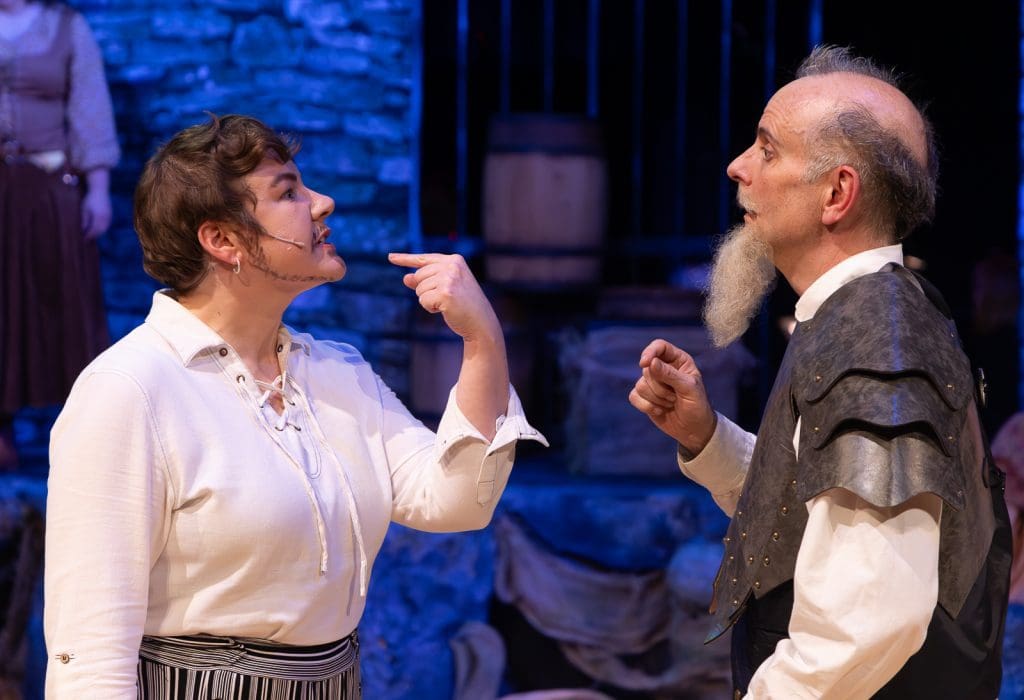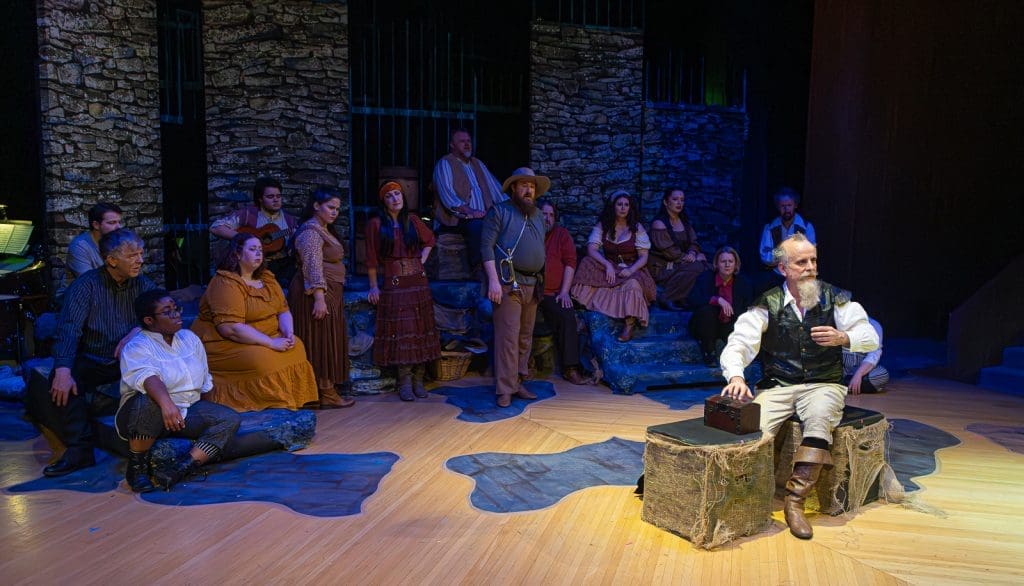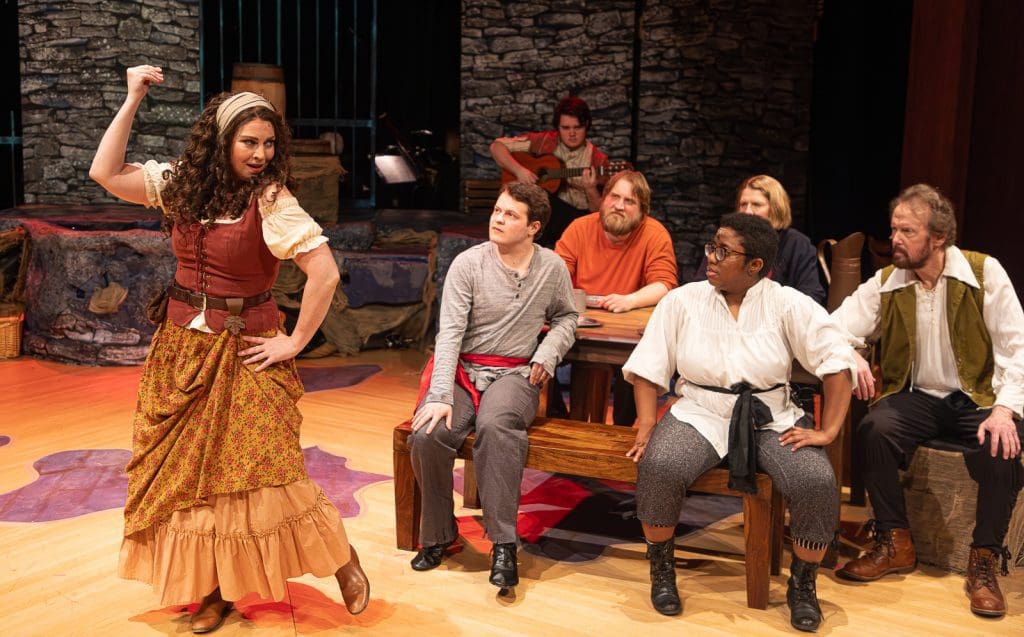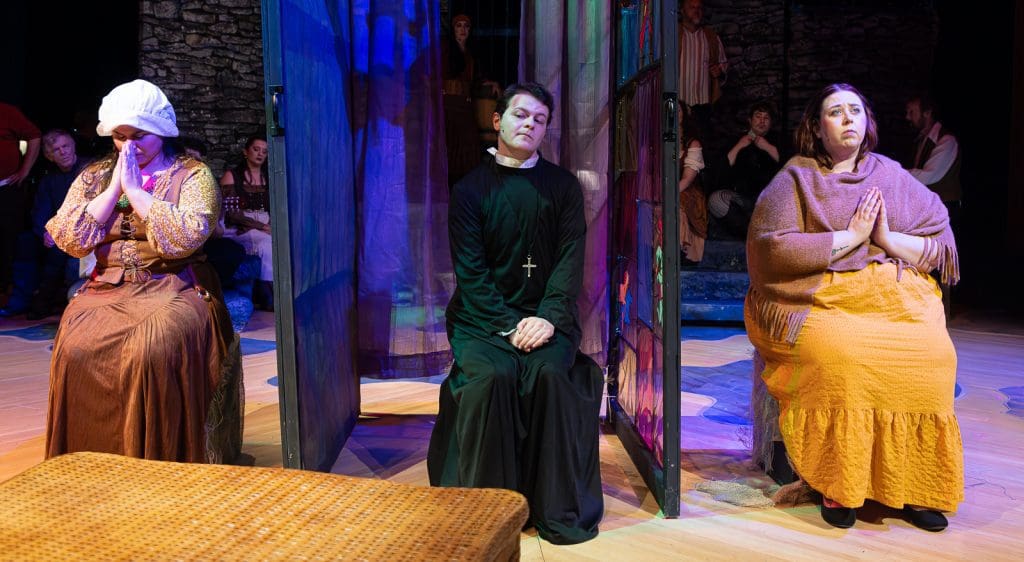

“The innocent must pay for the sins of the guilty.”
When we first started working on Man of La Mancha, this line from the Housekeeper stood out to me because it seemed so out of place. What exactly was this line doing in a play about the triumph of hope?
The more I thought about it, the more I realized that “The innocent must pay for the sins of the guilty” had a lot to tell us about the world within Man of La Mancha. Set in the early 17th century, in the heart of the Spanish Inquisition, Cervantes finds himself in prison for applying the law equitably – and foreclosing on a church as a result. Cervantes is an innocent man, paying for the sins of the guilty – in this case, the Church, refusing to obey the law. The “innocent/guilty” line from the Housekeeper later in act 1 tells us that Alonso’s family is “paying” for his sin of renaming himself Don Quixote and sallying forth to right all wrongs. But is Alonso’s family – Antonia, Dr. Carrasco, and the Housekeeper – really innocent? When Dr. Carrasco says, “There’s a certain embarrassment of having a mad man in the family,” he’s only concerned about his own reputation. However, his character makes me wonder: is it mad to believe that “virtue shall triumph”? Or is it mad to believe that virtue can triumph at all?

The entire play hinges on the binary between skepticism and belief – not in a deity, but in whether humankind is doomed to corruption or if it can be good. Is it madness, as Cervantes says, “to see life as it is [corrupt] and not as it ought to be [honorable]”? Certainly, during the Spanish Inquisition, it had to feel like one lived in a paradox: the Catholic Church was attempting to control the Christian narrative in an era of protestant reformation, and in their attempts to maintain power, corruption was rampant. How could the Church claim to be a moral authority while treating free thinkers as heretical enemies? How could the compassion and peace proclaimed by Jesus be represented by an entity that tortured people and forced acquiescence?
In the end, the characters in Man of La Mancha choose to believe in hope and human potential, none so much as Aldonza, renamed Dulcinea (“sweet one”), who leaves behind a life fraught with shame and violation, and embraces a new path – one in which she recognizes her survival as a strength. While nothing turns out the way she imagined, Aldonza/Dulcinea takes on the mantel of Don Quixote, as do the other prisoners, believing that dreaming impossible dreams is, perhaps, the only way to confront a world that is not only unfair, but often uncaring. It is through storytelling that Cervantes convinces the prisoners not to punish him, on top of the Inquisition itself, and in that drama, we learn that what people need most in the world is hope. Without hope, we fall victim to cynicism and never seek to improve the world or ourselves.

I owe my theatre life to Man of La Mancha. When I was a freshman in high school, I saw the show performed in Shelton Auditorium. I’ve never forgotten the way Man of La Mancha made me feel. I was an angsty youth, not sure who I was or what I believed in. Hearing the words to the signature song “Impossible Dream” for the first time, I felt like it had been written just for me: “To dream the impossible dream, to fight the unbeatable foe, to bear with unbearable sorrow, to run where the brave dare not go.” This was Don Quixote’s quest, and it became my quest, too – to follow my dreams, even if no one else believed in them. The relentless pursuit of my dreams, “no matter how hopeless, no matter how far,” has been both fulfilling and painful at times, but I have never regretted it.
Pursuing a life in the arts often feels like an impossible dream, and one that is widely misunderstood. There is very little, if any, money in it for most people. It is hard work, full of compromises and sacrifice. But sometimes doing the work means changing lives. Seeing this play as a teen literally changed my life. It made me see that there were possibilities beyond my immediate context. It made me wonder if someone, someday would see me as their Dulcinea. It made me feel less alone. It gave me hope.
I think the reason why many of us participate in the arts is because, yes, we love it, but also because at one point, our lives were changed for the better because of it. My dream for this show is to reach that kid who is hopeless, to touch that adult who is burned out and struggling, to give a moment of beauty to a world that can be dark and bleak. With Man of La Mancha, our quest is to give you a glimmer of hope through storytelling and to inspire you to keep dreaming.

I am so grateful to the cast, crew, and musicians who are bringing Man of La Mancha to life. We have worked hard for months to make this dream a reality, and it has been an incredible journey – one I have been thinking about for over 30 years. I am especially grateful to my husband, Aric, for being my Don Quixote – the person who believed in me when I could not believe in myself. May we all find that light in the darkness in our (mis)adventures.
Share :
Southbank Theatre Company is a nonprofit, tax exempt 501(c)3. That means every financial contribution is tax deductible! No matter how big or small, your contribution supports theatre artists and the stories they bring to our audiences. With your help, we will be able to build a sustainable, creative company in Indianapolis that will celebrate emerging and established artists from all backgrounds.